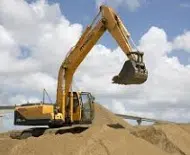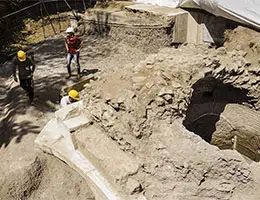 The Latin word excavatio came into Spanish as excavation . The notion refers to the act and result of digging : making a hole , a pothole , a hole or a trench . This action involves extracting material or part of the mass of a solid , removing it from where it was.
The Latin word excavatio came into Spanish as excavation . The notion refers to the act and result of digging : making a hole , a pothole , a hole or a trench . This action involves extracting material or part of the mass of a solid , removing it from where it was.
For example: "The judge ordered an excavation in the garden of the house to try to find the remains of the victim" , "The researchers suggested carrying out a new excavation in the region since there could be more buried fossils" , "The most recent has allowed us to reveal several rooms of the Roman palace .
Excavation is one of the most frequent procedures in archeology and geology . In this way, objects from the past can be unearthed and brought to light.
When an excavation is carried out, layers of soil are removed in the reverse order of their formation (since the layers closest to the surface are the least old). Excavation always involves a certain degree of destruction because the original position of the sediments no longer exists.
Excavation processes are linked to stratigraphy : the study of strata . In some areas, elements from different periods coexist underground; That is why it is important to detect and distinguish the various strata and thus determine which belongs to each object.
Beyond archaeology, excavations are also carried out to build basements and to carry out other types of works . In the framework of engineering and architecture, excavating means extracting volume of soil.
Given the technological advances related to this activity, it is possible to carry out excavation manually or using certain machinery, and this depends mainly on the type of soil in which you wish to work. Other issues also come into play to organize the work, such as slopes, levels, elevations and dimensions, as indicated on the plans.
To carry out an excavation, several different materials and tools are necessary, and it is normal for workers to place them next to the work site, to prevent them from interfering with their activities. A concept related to excavations is the phreatic level , that is, the upper level of any aquifer; If this is very high, then it becomes important to use pumping equipment. With respect to height, shoring must be used to prevent potential wall slippage in excavations higher than 2 meters.
 There is a long list of risks that make the work of excavators difficult, and that is why it must be studied very carefully before starting any project, to take the necessary precautions in each case; Among the most common are the following:
There is a long list of risks that make the work of excavators difficult, and that is why it must be studied very carefully before starting any project, to take the necessary precautions in each case; Among the most common are the following:
* falls, both at the initial level and at the bottom of the excavation;
* loosening of rocks, earth or any other work material;
* the land or buildings adjacent to it collapse;
* that the workers are trapped;
* floods;
* injuries due to accidents with tools or work objects;
* vehicle crashes;
* overturning of machines;
* excessive noise for prolonged periods, causing damage to personnel;
* direct contact with gas or electricity, or even water leaks, due to the involuntary destruction of underground channels.
When an excavation is carried out in a grave, the contents must be removed methodically, paying special attention to the condition of the corpses, leaving a record of their positions and preserving all their skeletal remains . In addition, it is mandatory to draw up the floor plan and elevation, taking note of the construction technique used.
